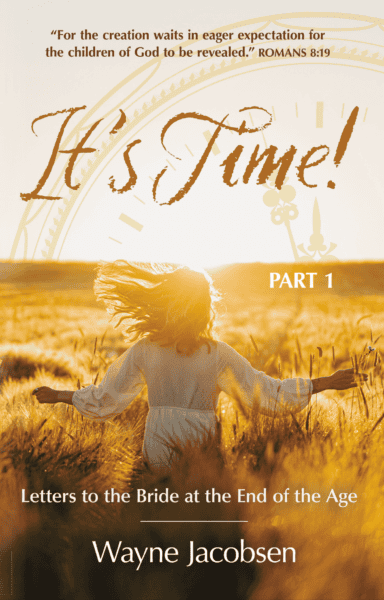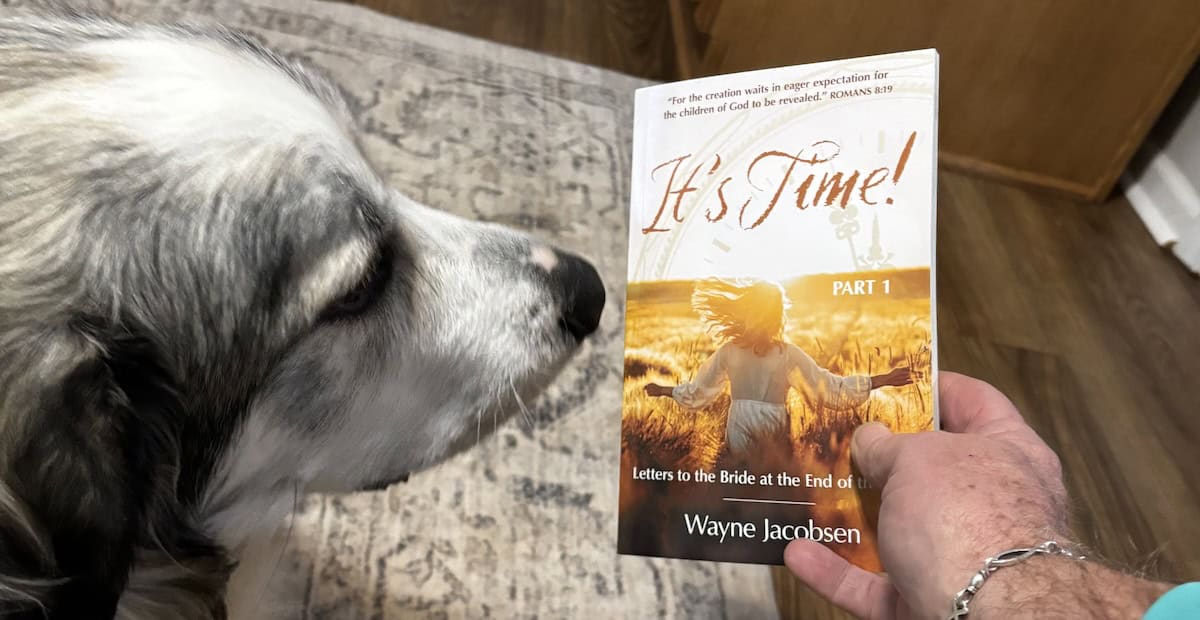Chapter 18: Holding God’s Pain
Note: This is the eighteenth in a series of letters written for those living at the end of the age, whenever that comes in the next fifteen years or the next one hundred and fifty years. We have already released the first part of this book in print. You can also access the previous chapters here. If you are not already subscribed to this blog and want to ensure you don’t miss any of them, you can add your name here.
_________________________________
As I have read the previous letters, I can’t help but wonder what God is thinking as he views the atrocities of human history. Is he angry at the wars we wage, or the power the wealthy hold over the poor? Can we even know what he feels?
— Ivanna, wife and mother who also operates a bakery in Ukraine
Ivanna,
I’m so sorry for what has happened over the past three years in your country. The uncertainty, devastation, and bloodshed must weigh heavily on your heart. You are in my prayers.
Of course, we can’t speak definitively about what God thinks or feels. His ways are much higher than ours; his perspective is beyond our finite view. He does not see death as an end. However, we get glimpses of his thoughts because he makes himself known to his people. I sense things about him when I pray for people or events. They are momentary glimpses, to be sure, but there would be no communion if there were no exchange of heart and mind.
Honestly, I don’t sense much anger in him, which is shocking for someone who grew up with terrifying stories about an angry God. When we’re victimized, anger rises quickly, and we want God to share it. But when Jesus lived among us, we didn’t see him angry or seeking vengeance. What we see is love, and in that love, sorrow and grief for what we suffer and for those who refuse him. He didn’t come to bring condemnation but forgiveness and salvation. Maybe we misunderstood those Old Testament stories after all.
His redemption is not powered by anger but love, meriting our trust, not our fear. This may be most critical for last-day believers. I want to share with you a personal encounter that has profoundly impacted me, and the doors it has opened in deepening my walk with God, and having more compassion for those who are lost in the darkness is profound. But before I do, let me remind you of that moment Jesus sought to share his anguish with his closest friends.
Watch with Me
 The night before he died on the cross, Jesus was “consumed with sorrow.” He went to the Garden of Gethsemane to sort things out with his Father and invited three of his disciples to share that intimate moment. His pain was immense, distressed enough that his sweat became like drops of blood. What did he hope to gain by having them there, or what would it give them?
The night before he died on the cross, Jesus was “consumed with sorrow.” He went to the Garden of Gethsemane to sort things out with his Father and invited three of his disciples to share that intimate moment. His pain was immense, distressed enough that his sweat became like drops of blood. What did he hope to gain by having them there, or what would it give them?
Perhaps it’s as simple as Jesus did not want to be alone, and their presence would comfort him? Could he also have wanted to show them something about his heart? We don’t really know because they slept through it, unable to watch with him even for an hour.
He warned them to “Watch and pray that you may not enter into temptation.” They couldn’t stay awake long enough and fell into temptation that night, abandoning their friend in his hour of need. Surely, they didn’t realize what was going on that night, and perhaps their slumber was a way to dissociate from the disconcerting talk of his leaving them.
The redemption of the world hung in the balance, and to accomplish it, Jesus had to choose to endure the most horrific torments of unjust humanity. He was distressed at the prospect and hoped there might be another way to redeem humanity. And yet, he settled it in his heart with, “My Father, if it be possible, let this cup pass from me; nevertheless, not as I will, but as you will.
Jesus did escape temptation that night, but I can’t help wondering what it would have been like for the disciples to share that moment with Jesus. Was sorrow and grief his alone to bear, or was there something for them to learn inside his suffering?
“Now You’re Ready to Hold My Pain”
Honestly, I would never have considered experiencing God’s pain except for an engagement I had with him over two years ago. I woke up early one morning for a medical appointment. As I got dressed, I felt deep sorrow and grief, which was strange since I hadn’t gone to bed that way.
The previous three years had been brutal. My wife encountered a previously unknown childhood trauma, only to be told by her therapist that she must be married to an abusive husband. She left me when I was out of town, and it took us weeks to sort through the lies and find our way back to each other. Also, I had lost a meaningful, lifelong relationship when some in my extended family spread lies about me.
Even though those situations had been mostly resolved by that morning, all the emotions were back. On my drive, I wanted to sort that out with God. I found myself praying, “Last year I lost every family relationship I valued to lies about me.” Tears streamed down my face as I relived it. And wanting to bring God into that pain, I added, “And you allowed it to happen.” As soon as I said it, I knew I was putting blame in the wrong place.
So, I repeated my pain again, this time adding, “And you watched it happen.” That was true enough, but again, not fair to him. He hadn’t watched as some dispassionate observer.
One last time I prayed, “Last year I lost every family relationship I valued to lies about me, and you were with me in it.” There it was! He had been with me through it all to bring healing where he could and guide me where others weren’t open to it. Into my pain seeped his love and even joy that I had not been alone.
After reveling in the sanctity of that reality, a strange thought ran through my head. Now you are ready to hold some of my pain. It seemed like God whispering to me, but I had no idea what it meant. What pain did he have, and why did he want me to hold it? Then, a second thought explained the first. I lost every relationship I value to lies about me.
It took a moment for that to sink in. From the serpent’s lie in Eden, down through history to those who reject him today because they don’t know who he is, God has been the victim of the worst lies. Thinking of what God has suffered by human unfaithfulness, I began to weep again, overwhelmed with a sorrow greater than my own. I know I only got a small taste of his pain that morning, but I find him inviting me there often.
The Fellowship of His Suffering
When Paul referred to the fellowship of his suffering in Philippians 3, I have always taken it to mean that Jesus comforts us inside our pain. He understands what we go through because he has experienced more pain than we ever could. Shared suffering lets us know him at a depth we would miss otherwise.
However, I never noted that it’s his suffering we fellowship in, not just our own. I skipped over that part since his pain was already past. What would he suffer now? My conception of God is that he exists in victory and dwells in peace and beauty. We hope to join him there someday. If the state of the world pained him, wouldn’t he just fix it?
Since that morning, I’ve learned that the world’s brokenness touches the Godhead deeply. Jesus didn’t just suffer during his week of passion. It wasn’t just Gethsemane, his trial, or the cross, but also at Lazarus’ tomb for the grief of his friends. Earlier, he had looked at the crowds with compassion and saw many who were “harassed and helpless, like sheep without a shepherd.” The writer of Hebrews told us he often offered loud cries and tears to God. (Hebrews 5:7)
As our empathetic high priest, he holds humanity with intense love even as many reject him. How could he not suffer, not just then but now? This broken creation offers up constant tragedy, war, abuse, oppression, disease, and lies that devastate people he loves. Wouldn’t that touch God more deeply than it touches us?
My greatest tears have been shed not for myself but for the pain or loss of people I love. What is worse, our own suffering or that of our children? That morning, I discovered the agony inside of God for the lostness of his Creation. It was not pain for his loss but for ours. He holds us in his heart, quite aware of our suffering, and it powers his desire to bring redemption in the most devastating circumstances. I have come to view the world through that lens.
Holding God’s Pain
In Chapter 11, I wrote about how learning to gaze with God changed my prayer life. I no longer found myself trying to convince him to do what I wanted, but to help me see the events in my life and the world through his eyes. Knowing a small measure of his loss in the broken creation has brought me closer to him. As I gaze with God at world events, I find greater freedom from my self-preoccupation, which allows me to find a deeper place in his heart.
How do I hold pain with God? I sit with him, gazing at the circumstance that concerns me, contemplating it from his perspective. I wait until I have a sense what he feels in that. Sometimes, it takes days or weeks, as I wait for him to show me.
As I get a glimpse of that, I reflect on the emotion or insight he brings. It has shaped my prayers in interesting ways. I don’t try to fix his pain or offer my ideas for a way out. I hold my heart alongside his and see what comes. I reflect on his power and wisdom as I remind myself that everything is in his hands. That helps me look beyond the pain to hear the refrain of his love seeping through. He is not alarmed or disturbed because his plan is unfolding. He’s the Redeemer in this story and will prevail overall.
This may not be for everyone. Indeed, don’t start here. Until you’ve tasted deeply of his love for you in your own anguish and learned to trust him, trying to imagine God’s pain will only draw you into despair. Let him share your pain before you look to share his. He’ll invite you in when you are ready, but I suspect I’m not the only one who has tasted this.
I find it curious that Jesus didn’t need a lot of people to do this. He only asked three of his disciples. I wish at least one of them had stayed with him through it. It’s a tender moment to be in fellowship with his suffering and to know his heart for lost people. Sharing that is a deep place of intimacy. I am intrigued and excited at what might lie down this road for me and others who feel a similar call.
How It Has Changed Me
Why would he want any of us to watch with him in this season of redemptive history?
I’m honestly not sure what it does for him. It may simply be what friendship does; it holds each other’s pain as well as their joy. The pain I felt when my wife was gone is my teacher here. What I felt for her then and now puts me in touch with what God feels for the brokenness in his creation. It has changed me in a variety of ways.
First, I see world events differently. A few decades ago, my world was conveniently divided into a home team and an away team. God loves those who acknowledge him. I could pray with passion for God to alleviate their suffering. God hates the away team, and we can pray down his vengeance on them, which gave me false comfort in my anger and helplessness. Dividing the world that way made it simpler to route my grief and fear in times of tragedy.
I just don’t believe any of it anymore. Love taught me how misguided I was. God’s heart breaks for the whole of humanity, for those who know him and those who don’t. Today, he holds the same grief for the Palestinian mom mourning her child as he does for the Jewish mom grieving hers. That doesn’t discount the horrible evil people bring into the world, but it does change the way I pray both for victims and victimizers. I’ve been invited to a different kingdom where love defines our responses, not vengeance or righteous indignation. Just how did we think Jesus would tell us to love our enemies and think God gets to hate his?
Second, I don’t want to add any more pain to the planet. I am more mindful in my engagements with people to treat them fairly, lovingly, and honor my relationship with them. I also want to live generously toward those in pain to help relieve my Father’s anguish on their behalf.
Third, I’ve discovered how these moments with him expose the deeper places in my heart. Solomon said, “Sorrow is better than laughter, for a sad countenance is good for the heart.” (Ecclesiastes 7:3) We all crave times of joy, but it is sorrow and grief that allow us to drill down to the deepest places where we discover what is most important.
Fourth, I read Scripture differently, seeing an anguished Godhead rather than an angry one. While we may want to lash out and blame others for our suffering, Jesus is not inclined to do so. As I read the Old Testament prophets now, I see anguish for the wayward, not anger. This is the power of the laments. It is not just our pain being held there but his too. And at the same time, we see his capacity to spread redemption in the world amid human suffering.
Fifth, it has changed my heart for the lost. Now, loving my enemies becomes possible because I see them as those convulsing in pain for living outside of God’s reality. Truly, they do not know what they do to others as they compensate for their loneliness and believe the lies of darkness.
 Ecstasy and Agony
Ecstasy and Agony
Ivanna, lest you think holding some of God’s pain leads to a despairing life, I assure you it does not. Remember, God not only grieves for humanity, but he is also the most joyful presence in the universe. Jesus said he wanted his joy to be in us so our joy could be complete.
Because of him, I now know that agony and ecstasy can co-exist in the same space. I once thought they were mutually exclusive. Times of pain overwhelmed everything else and drove out my joy until they ended. Now, I can hold my pain before him and at the same time look for his joy to be there as well. I have learned that from watching him. As much as he feels the brokenness of humanity, he also delights in the redemption he brings to it.
One friend said, “It seems he wants us to hold in our hearts the agony of the world and the victory of the cross simultaneously.” I love that. That may not make much sense until you experience it, but once you do, you can find contentment in whatever situation you are in.
Jesus’s friends couldn’t hold his pain on the eve of his crucifixion, but we can today. Over the past two years, it has transformed my thinking—how I view others and how to find the redemption story in the unfolding realities of our ever-darkening world. It saves me from giving in to anger and vengeance and finding a place for love to thrive in my prayers and heart.
As the earth moves relentlessly towards its inevitable conclusion in Christ, we can partner with him by holding his pain and praying to advance his purpose in current events. If I don’t see what he sees, I’m only left to offer up fruitless requests for my comfort or agenda in the gathering darkness.
The people who will be most helpful at the end of days are those who know both his agony and his ecstasy.
_________________________________
 Order Part 1 of It’s Time from Amazon in Kindle or paperback, or read previous chapters online.
Order Part 1 of It’s Time from Amazon in Kindle or paperback, or read previous chapters online.





 I know that seems simple, but it’s easy to push God out of our suffering and try to handle it with our own strength. We do that in several ways. The most common is to blame him. Whether you think he orchestrated or just allowed it won’t matter. How do you run to someone for aid and comfort when you think they’re the source of your pain? He certainly isn’t, but many think he is. However, he can walk us through it, even utilizing it to do a deep work within.
I know that seems simple, but it’s easy to push God out of our suffering and try to handle it with our own strength. We do that in several ways. The most common is to blame him. Whether you think he orchestrated or just allowed it won’t matter. How do you run to someone for aid and comfort when you think they’re the source of your pain? He certainly isn’t, but many think he is. However, he can walk us through it, even utilizing it to do a deep work within. Just because you are in need doesn’t mean you have to focus all your attention on yourself. Pain is easier to negotiate when you can find ways to bless others.
Just because you are in need doesn’t mean you have to focus all your attention on yourself. Pain is easier to negotiate when you can find ways to bless others.

 Navigating Without Control
Navigating Without Control

 The Power of Love
The Power of Love
 Any good teacher will tell you that humor and play are the best ways to help people learn, just like any father would do with his children. Play connects us to intimacy while allowing us the distance of humor to grasp the power of truth. The Scriptures that help us connect with play are those that speak so positively about laughter, joy, and childlikeness. “Unless you change and become like little children, you will never enter the kingdom of heaven” (Matthew 18:3). Children are always at play; humor and laughter draw them into a conversation, and if you can engage that way, you will be able to teach them far more than yelling at them will accomplish.
Any good teacher will tell you that humor and play are the best ways to help people learn, just like any father would do with his children. Play connects us to intimacy while allowing us the distance of humor to grasp the power of truth. The Scriptures that help us connect with play are those that speak so positively about laughter, joy, and childlikeness. “Unless you change and become like little children, you will never enter the kingdom of heaven” (Matthew 18:3). Children are always at play; humor and laughter draw them into a conversation, and if you can engage that way, you will be able to teach them far more than yelling at them will accomplish. Jesus showed us how to live differently and then gave us everything we needed to walk as he did. He was not preoccupied with sin or living in fear of God’s punishment. He didn’t pursue personal piety or think himself excluded from God by the lack of it.
Jesus showed us how to live differently and then gave us everything we needed to walk as he did. He was not preoccupied with sin or living in fear of God’s punishment. He didn’t pursue personal piety or think himself excluded from God by the lack of it. Do you see how the emphasis changes? As our hearts are shaped by his love, we find ourselves empathetic for others instead of using them to our benefit. That’s why Jesus said that doing to others what we would have them do to us would fulfill all the law and the prophets. This is how we participate in God’s justice—putting ourselves in the place of the other and treating them the way we would want to be treated if you were them.
Do you see how the emphasis changes? As our hearts are shaped by his love, we find ourselves empathetic for others instead of using them to our benefit. That’s why Jesus said that doing to others what we would have them do to us would fulfill all the law and the prophets. This is how we participate in God’s justice—putting ourselves in the place of the other and treating them the way we would want to be treated if you were them.
 Why does God choose to engage it this way? Couldn’t he just be clearer from the outset? I don’t know that God has chosen to speak to us in riddles, I just think it looks that way from our side. The Creator connecting with his creation is a reality all its own and we wake to it like a small child growing to appreciate the world she is in. Everything comes in bits and pieces as she learns to navigate the world outside the womb.
Why does God choose to engage it this way? Couldn’t he just be clearer from the outset? I don’t know that God has chosen to speak to us in riddles, I just think it looks that way from our side. The Creator connecting with his creation is a reality all its own and we wake to it like a small child growing to appreciate the world she is in. Everything comes in bits and pieces as she learns to navigate the world outside the womb.
 Enjoy the Journey
Enjoy the Journey While anger can provoke people to action, it does not endear them to Jesus or his purpose in the world. Righteous indignation is a great way to justify turning our fears into hatred. The voice of Jesus comes with tenderness and invitation, even when he clears out the temple or confronts religious leaders for their hypocrisy.
While anger can provoke people to action, it does not endear them to Jesus or his purpose in the world. Righteous indignation is a great way to justify turning our fears into hatred. The voice of Jesus comes with tenderness and invitation, even when he clears out the temple or confronts religious leaders for their hypocrisy.  If you hear these words calling you to be a doormat for the abuse of others or a whipping post for their rage, you’re not ready for them. Giving up control doesn’t diminish our authenticity nor prevent us from establishing boundaries where others seek to harm us. Jesus didn’t let the Pharisees co-opt him, nor did he react to their threats.
If you hear these words calling you to be a doormat for the abuse of others or a whipping post for their rage, you’re not ready for them. Giving up control doesn’t diminish our authenticity nor prevent us from establishing boundaries where others seek to harm us. Jesus didn’t let the Pharisees co-opt him, nor did he react to their threats.